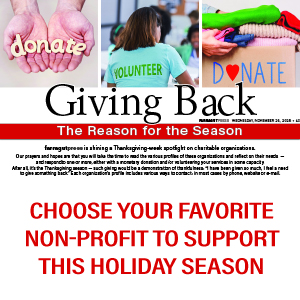Veteran uses learned skills for Town

While in the Air Force, he organized security on bases. Now, he uses those organizational skills for the Town.
Before coming to Farragut as a paid employee in January 2024, Sheffield was with the Town in a fellowship status in September 2023 through a program, Skillbridge. It is a program “that allows military members who are separating from the service, either having finished up their commitment or, in my case, retiring, to essentially become fellows, or interns, in another government agency, a local business or industry and allows those folks who are changing their career paths to go, while still employed by the military, to new agencies to learn skills or immerse in their next life.”
In Sheffield’s case, he was involved in the Veterans Local Government Management Fellowship Program through the International City and County Managers Association.
“That program placed me here with the Town as an introduction to city and county management,” he said. “So, from September ’23 until December, I was an active duty Air Force officer, but my full-time job was with Farragut, learning that life.
“And, at the end of December, I retired (from the Air Force) and became a civilian,” Sheffield said. “Then the very next week, I started as a paid employee here (with the Town).”
At 18, he enrolled in the U.S. Air Force Academy, straight out of Billings West High School, Billings, Montana, in June 1995.
Sheffield remembered his parents were supportive of his decision.
“I didn’t grow up in a military family,” he said. “Neither of my parents served.”
His grandparents served in World War II and the Korean War, but “I didn’t have a direct long military legacy in my family,” Sheffield reflected.
Still, he said, the academy offers “a tremendous education. It’s a very selective school, so to be able to get into that school and know that there’s great opportunities on the other side of finishing that program, they were very supportive of that.
“And over the years, they had lots of opportunities to visit me in different parts of the world.”
Sheffield’s inspiration to join started when he was 9 or 10 years old and his family took a road trip from Billings to see family in the Dallas, Texas, area.
“At one point, we stopped in Colorado Springs, Colorado, … we drove to the U.S. Air Force Academy, which is right there,” he recalled. “My parents let me just see the place as a tourist, if you will, and that stuck with me.
“I will tell you, from the age 9 or 10, I knew I was going to be in the Air Force, and I was going to go to the U.S. Air Force Academy,” Sheffield said. “That was my plan. Of course, that worked out.”
He graduated from the
academy in June 1999 and was commissioned as a second lieutenant.
“I commissioned into a career field called security forces,” Sheffield said.
He explained its job is to secure and protect Air Force bases in any environment.
“In the United States, that means that they are the guys who stand on the perimeter and make sure people who come on the base have authority and privilege to be there,” Sheffield said. “They are the folks who do all the law enforcement on the base. They are the folks who provide security for those airplanes and those weapons systems on the base.”
In overseas environments, such as a combat zone — Iraq, Afghanistan or Syria, he said, “they are the folks who might do that same role but, as you might imagine, it’s a different environment.
“You’re not protecting against a wayward Coca-Cola delivery driver who goes to the wrong place,” Sheffield said. “You’re protecting against Al Qaeda or ISIS or whatever threat happens to exist in the area you’re operating.”
He deployed to combat zones twice: Iraq in 2007 and Afghanistan in 2010. Aside from those deployments, from where he went temporarily then went home, Sheffield also had four overseas assignments, from where he was physically assigned on a base. He spent a year in South Korea; a year at a small counter narcotics location in Ecuador; three years in Germany, where he was on the staff of the U.S. Africa Command; and a year in Turkey.
In the combat zones, “by virtue of the operating environment we had in both of those countries, there was no rear area — there was no front line (where the combat action is),” he said. “In both cases (Iraq and Afghanistan), those bases were subject to rocket and mortar attacks, perimeter incursions and perimeter attacks.
“You had constant threat of a car bomb or sniper attacks from perimeter,” he said. “But, I can say that at no point did I ever feel that I was directly being targeted. I didn’t feel that someone was actually shooting at me, per se.”
However, “there were definitely times when rockets and mortars impacted much closer to me than I would have liked,” Sheffield said. “I had a couple times where rocket or mortar landed certainly close enough that it would rattle everything in the room, knock things off the shelves, shook all the lights.”
Still, “I was not out in direct combat, fighting against forces,” he added.
Over the course of his career, Sheffield commanded three squadrons. In that role, he wore multiple hats but “in the most basic sense, I was the chief of police for three different military bases,” he said.
Sheffield also was the senior anti-terrorism officer on the base, looking at external threats, and he was the deputy commander of a security group guarding the Intercontinental Ballistic Missiles, (nuclear missiles) at Minot Air Force Base in North Dakota.
While on the staff of the Africa Command, he was responsible for protection operations, “so when U.S. units were planning to go to Africa to do our country’s bidding, we would build them the plan they would go execute and the portions of the plan that had to do with protecting that force when it went into Africa.”
Most notably, in 2014, Sheffield said there was a massive Ebola outbreak in western Africa.
“United States Africa Command was tasked by the president to help those countries fight Ebola in their countries and eradicate it and get those countries in a position they could take care of it themselves,” he said.
Sheffield’s office built the plan of how it would send a couple thousand American troops to Africa to set up clinics and logistics chains to help those countries help fight that disease.
“My office planned portions of the plan to protect Americans on the ground in that country,” he said.
Additionally, Sheffield was on the air staff of the Pentagon, which is the headquarters staff of the U.S. Air Force, where he was director of policy for security and anti-terrorism law enforcement for the Air Force.
In his final role with the Air Force, just before retiring, he was vice commander of support at Vandenberg Space Force Base in California, which was created in 2019 and launched rockets into space. He started that role in 2021.
Sheffield is married to Elizabeth, and they have three daughters, Olivia, Layla and Lainey.
He met Elizabeth when he was stationed F.E. Warren Air Force Base in Cheyenne, Wyoming, then later married in 2005, when Sheffield was stationed at Lackland Air Force Base in San Antonio, Texas. Sheffield’s daughters subsequently were born while stationed at different bases.
“Those kids absolutely traveled the world,” he said. “Olivia moved nine times before she was 14 years old. Any of the girls never did more than two years in the same school district … tough kids … got to see the world, do lots of things.”


